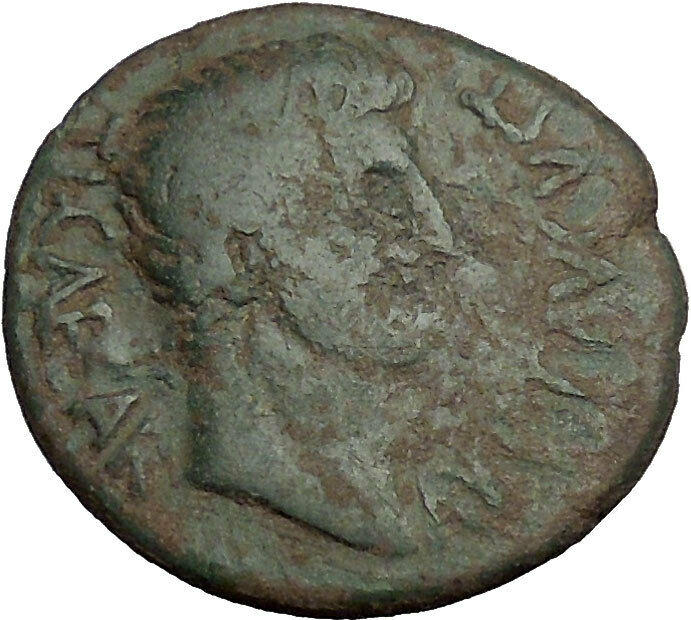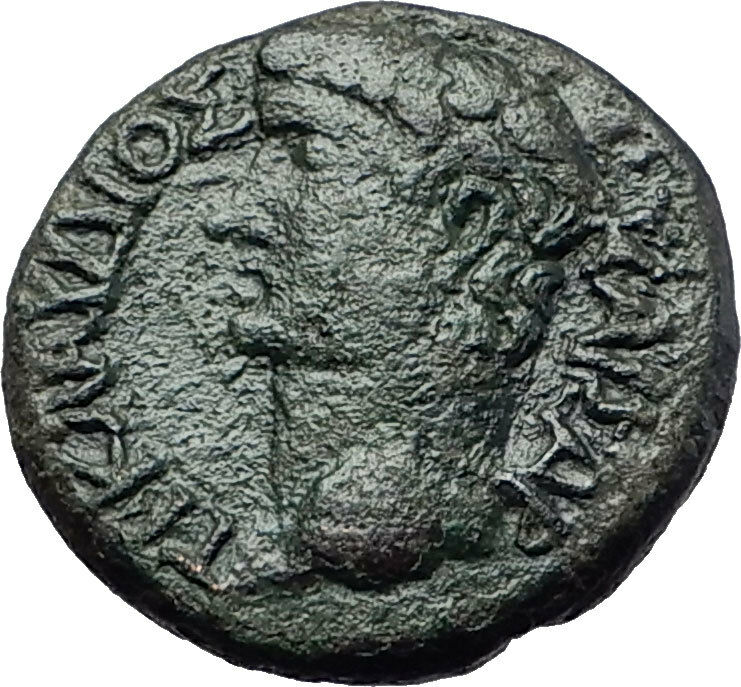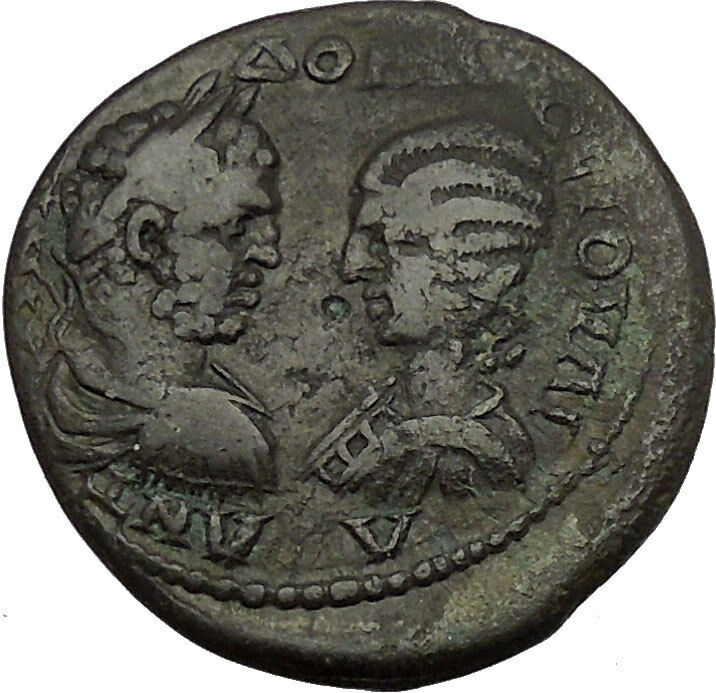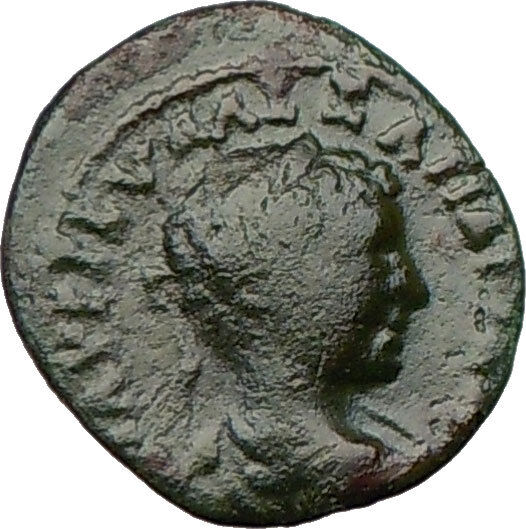|
Domitian – Roman Caesar: 69-81 A.D.
Emperor
: 81-96 A.D. –
Bronze 18mm (5.29 grams)
of
Ascalon in
Judaea
Dated CY 198, 94/95 A.D.
Reference: Rosenberger 118; Yashin 124; SNG ANS 700; RPC II 2216
CЄBAC, Laureate head right.
Phanebal standing facing, raising sword above head and holding shield and
palm branch;
HЧP (date) to left; AC to right.
You are bidding on the exact
item pictured, provided with a Certificate of Authenticity and Lifetime
Guarantee of Authenticity.
Judea (
Latin
: IVDAEA),
sometimes spelled in its original Latin forms of Judæa, Judaea or
Iudaea to distinguish it from
Judea
proper, is a term used by historians to
refer to the
Roman province
that incorporated the
geographical regions of
Judea
,
Samaria
, and
Idumea
, and which extended over parts of the
former regions of the
Hasmonean
and
Herodian
kingdoms of Israel. It was named after
Herod Archelaus
‘s
Tetrarchy of Judea
, of which it was an
expansion, the latter name deriving from the
Kingdom of Judah
of the 6th century BCE.
Rome’s involvement in the area dated from 63 BCE, following the end of the
Third Mithridatic War
, when Rome made
Syria
a province. In that year, after the
defeat of
Mithridates VI of Pontus
, the
proconsul
Pompeius Magnus (Pompey
the Great)
sacked Jerusalem
and entered the
Jerusalem Temple
. Subsequently, during the 1st
century BCE, the
Herodian Kingdom
was established as a Roman
client kingdom
and then in 6 CE parts became a
province
of the
Roman Empire
.
Judea province was the scene of unrest at its founding during the
Census of Quirinius
and several wars were
fought in its history, known as the
Jewish-Roman wars
.
The Temple was destroyed in 70
as part of the
Great Jewish Revolt
resulting in the
institution of the
Fiscus Judaicus
, and after
Bar Kokhba’s revolt
(132–135 CE), the Roman
Emperor
Hadrian
changed the name of the province to
Syria Palaestina
and
Jerusalem
to
Aelia Capitolina
, which certain scholars
conclude was done in an attempt to remove the relationship of the Jewish people
to the region.
Relations with Hasmonean and Herodian dynasties

Pompey in the Temple of Jerusalem, by
Jean Fouquet
The first intervention of Rome in the region dates from 63 BCE, following the
end of the
Third Mithridatic War
, when Rome made a
province of
Syria
. After the defeat of
Mithridates VI of Pontus
,
Pompey
(Pompey the Great) remained there to
secure the area.
The region at the time was not a peaceful place. The Queen of Judaea
Salome Alexandra
had recently died and her
sons, Hyrcanus II
and
Aristobulus II
, divided against each other in a
civil war.
In 63 BCE, Aristobulus was besieged in
Jerusalem
by his brother’s armies. He sent an
envoy to
Marcus Aemilius Scaurus
, Pompey’s
representative in the area. Aristobulus offered a massive bribe to be rescued,
which Pompey promptly accepted. Afterwards, Aristobulus accused Scaurus of
extortion. Since Scaurus was Pompey’s brother in law and protégée, the general
retaliated by putting Hyrcanus in charge of the kingdom as
Ethnarch
and
High Priest
, but he was denied the title of
King.
When Pompey was defeated by
Julius Caesar
, Hyrcanus was succeeded by his
courtier
Antipater the Idumaean
, also known as Antipas,
as the first
Roman Procurator
. In 57–55 BCE,
Aulus Gabinius
, proconsul of
Syria
, split the former
Hasmonean
Kingdom of Israel into five districts
of the Sanhedrin
.
Both Caesar and Antipater were killed in 44 BCE, and the
Idumean
Herod the Great
, Antipater’s son, was
designated “King
of the Jews” by the
Roman Senate
in 40 BCE.[5]
He didn’t gain military control until 37 BCE. During his reign the last
representatives of the
Maccabees
were eliminated, and the great port
of
Caesarea Maritima
was built. He died in 4 BCE,
and his kingdom was divided among his sons, who became
tetrarchs
(“rulers of a quarter part”). One of
these quarters was Judea corresponding to the region of the ancient
Kingdom of Judah. Herod’s son
Herod Archelaus
, ruled Judea so badly that he
was dismissed in 6 CE by the
Roman emperor
Augustus
, after an appeal from his own
population. Another,
Herod Antipas
, ruled as
tetrarch
of Galilee and Perea from 4 BCE to 39
CE, being then dismissed by
Caligula
.
Judea as Roman
province

The Roman empire in the time of
Hadrian
(ruled 117–138 CE), showing, in western
Asia, the Roman province of Iudaea. 1
legion
deployed in 125.
In 6 CE Judea became part of a larger Roman province, called Iudaea,
which was formed by combining
Judea proper
(biblical
Judah
) with
Samaria
and Idumea (biblical
Edom).[6]
Even though Iudaea is simply derived from the Latin for Judea,
many historians use it to distinguish the Roman province from the previous
territory and history. Iudaea province did not include
Galilee
,
Gaulanitis
(the Golan), nor
Peraea
or the
Decapolis
. Its revenue was of little importance
to the Roman treasury, but it controlled the land and coastal sea routes to the
bread basket
Egypt
and was a border province against the
Parthian Empire
because of the Jewish
connections to
Babylonia
(since the
Babylonian exile
). The capital was at
Caesarea
, not
Jerusalem
, which had been the capital for
King David
,
King Hezekiah
,
King Josiah
, the
Maccabees
and
Herod the Great
.
Quirinius
became
Legate
(Governor) of
Syria
and conducted the first
Roman tax census of Syria and Iudaea
, which was
opposed by the
Zealots
. Iudaea was not a
Senatorial province
, nor exactly an
Imperial province
, but instead was a “satellite
of Syria”
governed
by a
prefect
who was a
knight of the equestrian order
(as was
Roman Egypt
), not a former
consul
or
praetor
of
senatorial rank
.
Pontius Pilate
was one of these prefects, from
26 to 36 CE. Caiaphas
was one of the appointed
High Priests
of
Herod’s Temple
, being appointed by the Prefect
Valerius Gratus
in 18. Both were deposed by the
Syrian Legate
Lucius Vitellius
in 36 CE.
The ‘Crisis under
Caligula
‘ (37–41) has been proposed as the
first open break between Rome and the Jews.
Between 41 and 44 CE, Iudaea regained its nominal
autonomy
, when
Herod Agrippa
was made King of the Jews by the
emperor Claudius
, thus in a sense restoring the
Herodian Dynasty, though there is no indication Iudaea ceased to be a Roman
province simply because it no longer had a prefect. Claudius had decided to
allow, across the empire,
procurators
, who had been personal agents to
the Emperor often serving as provincial
tax
and finance ministers, to be elevated to governing magistrates with full state
authority to keep the peace. He elevated Iudaeas’s procurator whom he trusted to
imperial governing status because the imperial legate of Syria was not
sympathetic to the Judeans. Following Agrippa’s death in 44 CE, the province
returned to direct Roman control for a short period. Agrippa’s son
Marcus Julius Agrippa
was designated King of
the Jews in 48. He was the seventh and last of the
Herodians
. From 70 CE until 135 CE, Iudaea’s
rebelliousness required a governing Roman
legate
capable of commanding legions. Because
Agrippa II maintained loyalty to the Empire, the Kingdom was retained until he
died, either in 93/94 or 100, when the area returned to complete, undivided
Roman Empire
control.
Judaea was the stage of three major
rebellions against Roman rule
:
- 66–70 CE – first rebellion, followed by the destruction of
Herod’s Temple
and the siege of
Jerusalem
(see
Great Jewish Revolt
,
Josephus
)
- 115–117 CE – second rebellion, called
Kitos War
- 132–135 CE – third rebellion,
Bar Kokhba’s revolt
Following the suppression of Bar Kokhba’s revolt, the emperor
Hadrian
changed the name of the province to
Syria Palaestina
and Jerusalem became
Aelia Capitolina
which
Hayim Hillel Ben-Sasson
states was done to
erase the historical ties of the Jewish people to the region.
Under Diocletian
(284-305) the region was divided
into Palaestina Prima (Judea, Samaria, Idumea, Peraea and the coastal
plain with Caesarea as capital), Palaestina Secunda (Galilee, Decapolis,
Golan with Beth-shean as capital) and Palaestina Tertia (the Negev with
Petra as capital).
Titus Flavius Domitianus
(24 October 51 –
18 September 96), known as Domitian, was a
Roman Emperor
 who who
reigned from 14 September 81 until his death. Domitian was the third and last
emperor of the
Flavian dynasty
, the house which ruled the
Roman Empire
between 69 and 96 and encompassed
the reigns of Domitian’s father
Vespasian
(69–79), his older brother
Titus
(79–81), and that of Domitian himself.
Domitian’s youth and early career were largely spent in the
shadow of his brother Titus, who gained military renown during the
First Jewish-Roman War
. This situation
continued under the rule of Vespasian, who became emperor on 21 December 69
following the civil war
known as the
Year of the Four Emperors
. While Titus
effectually reigned as co-emperor with his father, Domitian was left with
honours but no responsibilities. Vespasian died on 23 June 79 and was succeeded
by Titus, whose own reign came to an unexpected end when he was struck by a
fatal illness on 13 September 81. The following day Domitian was declared
emperor by the
Praetorian Guard
, commencing a reign which
lasted fifteen years—longer than any man who had governed Rome since
Tiberius
.
As emperor, Domitian strengthened the economy by revaluing
the Roman coinage
, expanded the border defenses of
the Empire, and initiated a massive building programme to restore the damaged
city of Rome
. Significant wars were fought in Britain,
where
Gnaeus Julius Agricola
expanded the Roman
Empire as far as modern day
Scotland
, and in
Dacia
, where Domitian was unable to procure a
decisive victory against king
Decebalus
. Domitian’s government nonetheless
exhibited
totalitarian
characteristics. As emperor, he
saw himself as the new
Augustus
, an enlightened despot destined to
guide the Roman Empire into a new era of Flavian renaissance. Religious,
military, and cultural
propaganda
fostered a
cult of personality
, and by nominating himself
perpetual
censor
, he sought to control public and private
morals. As a consequence, Domitian was popular with the people and the army but
despised by members of the
Roman Senate
as a tyrant.
Domitian’s reign came to an end on 18 September 96 when he
was assassinated by court officials. The same day he was succeeded by his friend
and advisor Nerva
, who founded the long-lasting
Nerva-Antonine dynasty
. After his death,
Domitian’s memory was
condemned to oblivion
by the Roman Senate,
while senatorial authors such as
Tacitus
,
Pliny the Younger
and
Suetonius
published histories propagating the
view of Domitian as a cruel and paranoid tyrant. Modern history has rejected
these views, instead characterising Domitian as a ruthless but efficient
autocrat, whose cultural, economic and political programme provided the
foundation of the peaceful 2nd century.
Domitia Longina (b. 53 – c. 130) was an Empress and wife to the
Roman
Emperor Domitian
. She was the youngest daughter of the
general and
consul
Gnaeus Domitius Corbulo
. Domitia divorced her
first husband Lucius Aelius Lamia in order to marry Domitian in 71. The
marriage produced only one son, whose early death is believed to have been the
cause of temporary rift between Domitia and her husband in 83. She became
Empress of Rome upon Domitian’s accession in 81, and remained so until his
assassination in 96. She is believed to have died sometime between
126 and 130.
Family
Domitia Longina was born sometime between 50 and 55, as the youngest daughter
to the family of Gnaeus Domitius Corbulo
and Cassia Longina.[1]
Through her mother (a great-great-great granddaughter of Augustus), Domitia
Longina was a direct descendant of
Augustus Caesar
and one of the last remaining
members of the Julian lineage. Her paternal aunt was Milonia
Caesonia
, Roman Empress to
Caligula.
Her elder sister, Domitia Corbula
, married the senator Lucius
Annius Vinicianus. Domitia’s father Corbulo had been one of Rome’s most
respected Senators and generals, serving as
consul
under Caligula, and conducting military
campaigns in Germania
and
Parthia
under
Claudius and Nero
.[1]
Following the failed Pisonian conspiracy
against Emperor
Nero
in 65 however, Corbulo was disgraced when his family was brought in connection
to the conspirators. Corbulo himself was forced to commit
suicide,
while Annius Vicinianus and his brother Annius Pollio, were executed in the
ensueing purges.[2]
Little is known about the life of Domitia before her marriage to Domitian,
but sometime before 70, Domitia was married to
Lucius Aelius Plautius Lamia Aelianus
, a man of
senatorial
rank.[3]
Marriage
to Domitian
Reign
of Vespasian and Titus

The Triumph of Titus, by Sir
Lawrence Alma-Tadema
(1885). The
composition alludes to the rumoured love affair between Titus (back
left) and Domitia Longina (left, next to Domitian).[4]
Following Nero’s suicide on June 9, 68, the Roman Empire plunged into a year
long
civil war known as the
Year of the Four Emperors
, which saw the
successive rise and fall of the Emperors
Galba,
Otho
and
Vitellius. The crisis came to an end with the accession of
Vespasian,
who re-established peace in the Empire and founded the short-lived
Flavian dynasty. In 71, Vespasian attempted to arrange a dynastic
marriage between his youngest son Domitian, and the daughter of his eldest son
Titus,
Julia Flavia.[5]
By this time however, Domitian had already met and fallen in love with Domitia
Longina, and managed to persuade Lamia to divorce her, so that Domitian could
marry her himself.[5]
Despite its initial recklessness, the alliance was very prestigious for both
families. The new marriage rehabilitated Corbulo’s family, while serving the
broader Flavian propaganda
of the time, which sought to
diminish Vespasian’s political success under the less reputable emperors of the
Julio-Claudian dynasty
. Instead connections to
Claudius and Britannicus were emphasised, and Nero’s victims, or those otherwise
disadvantaged by him, rehabilitated.[2]
In 73, Domitia and Domitian’s only attested son was born. It is not known
what the boy’s name was, but he died in childhood sometime between 77 and 81.[6]
During this time, Domitian’s role in the Flavian government was largely
ceremonial
. While his elder brother Titus
shared almost equal powers with his father, Domitian was left with honours but
no responsibilities.[7]
This situation remained unchanged when Titus succeeded Vespasian as Emperor on
June 23, 79, leading both ancient and modern authors to suggest a mutual
animosity between the two brothers. In 80, Titus granted a
suffect consulship
to Domitia’s former husband
Aelius Lamia, according to Gsell as a personal insult against Domitian.[8]
On another occasion, when Titus urged Lamia to marry again, Lamia asked whether
“he too was looking for a wife”.[9]
After barely two years in office, Titus unexpectedly died of brain fever on
September 13, 81. His last words were reported to have been: “I have made but
one mistake”.[10]
The contemporary historian Suetonius
speculated on the possible
involvement of Domitian in his brother’s death, attributing his final words to a
popular rumour of the time, which held that Titus had carried on an affair with
Domitia Longina. However even he dismisses the story as highly unlikely.[6][10]
On September 14, the Roman Senate
confirmed Domitian as Titus’
successor, granting tribunician power, the office of
Pontifex Maximus, and the titles of
Augustus
, and
Pater
Patriae. Consequently, Domitia Longina became Empress of Rome.
Empress
of Rome
Shortly following his accession as Emperor, Domitian bestowed the honorific
title of
Augusta
upon Domitia, while their late son
was deified
. Both appeared on Domitian’s coinage
during this time. Nevertheless, the marriage appears to have faced a significant
crisis in 83. For reasons unknown, Domitian briefly
exiled
Domitia, and then soon recalled her,
either out of love or amidst rumours he was carrying on a relationship with his
niece Julia Flavia.[11]
According to Suetonius, Domitia was exiled because of an affair with a famous
actor named
Paris
. When Domitian found out, he allegedly
murdered Paris in the street, and promptly divorced his wife. Suetonius further
adds that, once Domitia was exiled, Domitian took Julia as his mistress, who
later died during a failed abortion
.[12]
Modern historians consider this highly implausible however, noting that many
of these stories were propagated by hostile senatorial authors, who condemned
Domitian as a tyrant
after his death. Malicious rumours, such
as those concerning Domitia’s alleged infidelity, were eagerly repeated, and
used to highlight the hypocrisy
of a ruler publicly preaching a
return to Augustan
morals, while privately indulging in
excesses and presiding over a corrupt
court.[13]
Domitian did exile his wife, but Jones argues that most likely he did so for her
failure to produce an
heir
.[6]
Nevertheless, rumours regarding Domitia’s alleged misconduct with Paris
circulated even in Domitian’s time, and he did not take insults directed at his
marriage lightly. Not long after his accession, Aelius Lamia was put to death
for the joking remarks made earlier during the reign of Titus.[14]
In 93, a son of Helvidius Priscus
was executed for having
composed a
farce satirizing Domitian’s separation from his wife. Stories of
Domitian’s affair with Julia were likely an invention of post-Domitianic writers
however.[15]
She died a natural death, and was subsequently deified by Domitian.[11]
By 84, Domitia had returned to the palace,[16]
where she lived for the remainder of Domitian’s reign without incident.[17]
Little is known of Domitia’s precise activities as Empress, or how much
influence she wielded in Domitian’s government, but it seems her role was
largely limited to ceremonial appearances. From Suetonius, we know that she at
least accompanied the Emperor to the
theatre
, while the
Jewish
writer
Josephus
speaks of benefits he received from
her.[18]
Despite the crisis of 83, their relationship appears to have been happy.
Domitian never married another woman in his life.
Later
years
On September 18, 96, Domitian was assassinated in a palace conspiracy
organized by court officials. His body was carried away on a common
bier,
and unceremoniously
cremated
by his nurse Phyllis, who mingled the
ashes with those of his niece Julia at the Flavian temple.[19]
The same day, he was succeeded by his friend and advisor,
Marcus Cocceius Nerva
. Ancient sources have
implicated Domitia in the conspiracy against Domitian, either by direct
involvement, or advance awareness of the assassination. The historian
Cassius
Dio, writing more than a century after the assassination, claimed
that Domitia chanced upon a list of courtiers Domitian intended to put to death,
and passed the information to his chamberlain
Parthenius.[20]
The story is most likely apocryphal however, with
Herodian
attributing a similar tale to the assassination of
Commodus.
According to Jones, the evidence suggests that Domitia remained devoted to
Domitian, even after his death.[18]
Twenty-five years after her husband’s assassination, and despite the fact that
his
memory had been damned
by the Senate, she still
referred to herself as “Domitia, wife of Domitian”.[18][21]
Sometime between 126 and 140, a temple dedicated to Domitia was erected in
Gabii.
She died peacefully.
|







 who
who 



